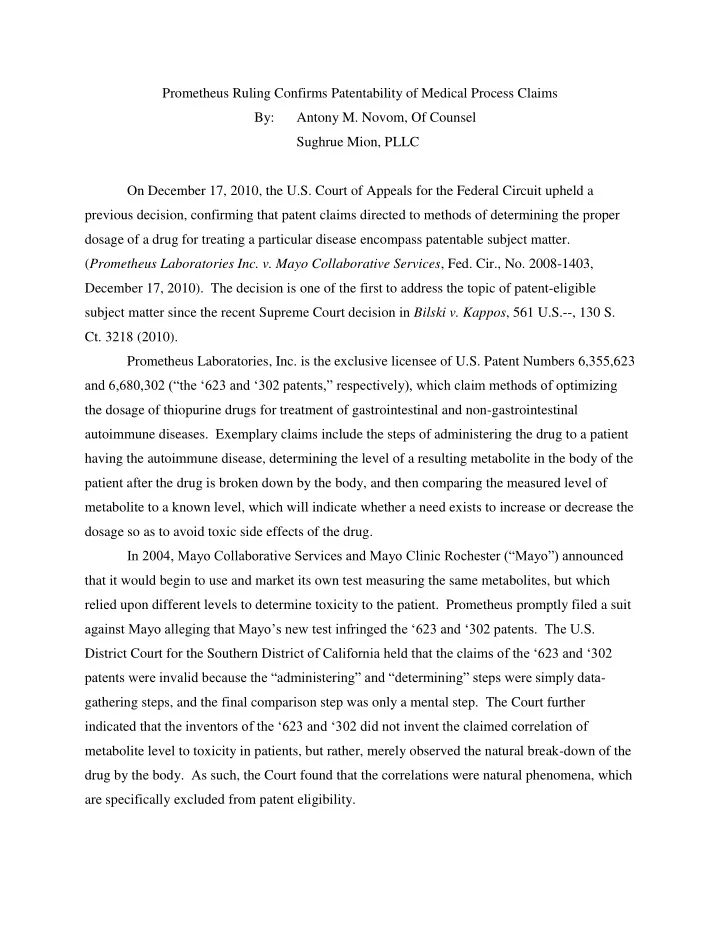

Prometheus Ruling Confirms Patentability of Medical Process Claims By: Antony M. Novom, Of Counsel Sughrue Mion, PLLC On December 17, 2010, the U.S. Court of Appeals for the Federal Circuit upheld a previous decision, confirming that patent claims directed to methods of determining the proper dosage of a drug for treating a particular disease encompass patentable subject matter. ( Prometheus Laboratories Inc. v. Mayo Collaborative Services , Fed. Cir., No. 2008-1403, December 17, 2010). The decision is one of the first to address the topic of patent-eligible subject matter since the recent Supreme Court decision in Bilski v. Kappos , 561 U.S.--, 130 S. Ct. 3218 (2010). Prometheus Laboratories, Inc. is the exclusive licensee of U.S. Patent Numbers 6,355,623 and 6,680,302 (“the „623 and „302 patents,” respectively), which claim methods of optimizing the dosage of thiopurine drugs for treatment of gastrointestinal and non-gastrointestinal autoimmune diseases. Exemplary claims include the steps of administering the drug to a patient having the autoimmune disease, determining the level of a resulting metabolite in the body of the patient after the drug is broken down by the body, and then comparing the measured level of metabolite to a known level, which will indicate whether a need exists to increase or decrease the dosage so as to avoid toxic side effects of the drug. In 2004, Mayo Collaborative Services and Mayo Clinic Rochester (“Mayo”) announced that it would begin to use and market its own test measuring the same metabolites, but which relied upon different levels to determine toxicity to the patient. Prometheus promptly filed a suit against Mayo alleging that Mayo‟s new test infringed the „623 and „302 patents. The U.S. District Court for the Southern D istrict of California held that the claims of the „623 and „302 patents were invalid because the “administering” and “determining” steps were simply data - gathering steps, and the final comparison step was only a mental step. The Court further indicated th at the inventors of the „623 and „302 did not invent the claimed correlation of metabolite level to toxicity in patients, but rather, merely observed the natural break-down of the drug by the body. As such, the Court found that the correlations were natural phenomena, which are specifically excluded from patent eligibility.
On appeal, the Court reversed the District Court‟s decision, upholding the validity of the „623 and „302 patents after applying what is known as the “machine -or- transformation” test. Under this test, a process is deemed to be patent-eligible if: (1) it is tied to a particular machine or apparatus, or (2) it transforms a particular article into a different state or thing. In particular, the Court found that the “administering” and “determining” steps were transformative and not merely data-gathering steps. Thus, the claims were not exclusively directed to natural phenomena. The Prometheus case returned to the U.S. Court of Appeals on remand from the Supreme Court for further considera tion in view of the Court‟s decision in Bilski v. Kappos , 561 U.S.--, 130 S. Ct. 3218 (2010). The Bilski decision rejected the machine-or-transformation test, as being the sole, definitive test for the determination of whether a process is patent-eligible subject matter, but rather indicated that it is a useful and important tool for making such a determination. However, the Court declined to institute any further rules other than the well-known patent- prohibited categories of: laws of nature, physical phenomena, and abstract ideas. The U.S. Court of Appeals again heard arguments from both parties regarding the validity of the patents in view of the Bilski decision and found that Bilski did not undermine the previous analysis of the claims in the „623 and „302 patents. The Court noted that patent claims must be considered as a whole, and while laws of nature and natural phenomena are specifically listed as patent-ineligible subject matter, the Supreme Court has established that application of these prohibited categories to a structure or process may render the subject matter as patent- eligible. In particular, the Court found that the step of administering is transformative of the human body, because a specific class of drug is being introduced into the body for a specific purpose, and it is the changes within the body as a result of the administration of the drug that enable the determination of the metabolite levels to occur. As such, the Court concluded that the claims satisfy the transformation prong of the machine-or-transformation test, and are not merely directed to a natural phenomenon. Finally, the Court indicated, that while the final comparison step may be a mental step, the step is substantially tied to a specific series of steps for treating a specific disease that involves administration of a specific class of drugs. The Prometheus ruling solidifies that method of treatment claims are patent-eligible subject matter in a post- Bilski world. In addition, it shows that courts will continue to use the
machine-or-transformation test as a tool to determine whether such claims are worthy of patent protection.
Recommend
More recommend